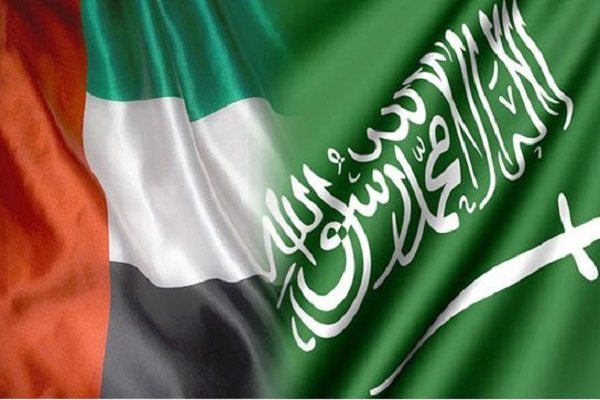Date: Friday, 25 January 2019

TEHRAN, Jan. 25, 2019 (MNA) – The Saudi-Emirati offensive in Yemen and bombing of innocent people in the country is some of the issues that have always been discussed between Saudi Arabia and the United Arab Emirates (UAE) on the developments in Yemen.
There was an unwritten agreement between the two countries on the spheres of influence: Saudi Arabia played a role in northern Yemen and the UAE supported southern groups. However, in the past three years, there has been a great deal of discord between the two countries over the division of influence in Yemen, and the field defeats. The launch of Yemeni ballistic missiles towards the UAE and Saudi Arabia, have also brought a dispute between the two states.
When Saudi-backed exiled President Abed Rabbo Mansour Hadi of Yemen, told the Saudi leadership of his desire to return to Aden, Riyadh replied that the Emirates were unable to comply with his request because it was not the right timing. Saudi Arabia strongly supports President Mansour Hadi, while the United Arab Emirates supports the Southern Transitional Council (STC), which seeks for an independent South Yemeni state.
Following the UAE objection, the pro-Mansour Hadi media and Yemeni Congregation for Reform (al-Islah) once again accused the Emirates of sabotaging the legal Yemeni government. Emirate media, for the first time since the meeting of Crown Prince of Abu Dhabi Mohammad bin Zayed, MbZ, with Chairman of the Islah party Mohammed al-Yadomi in December, resumed wave of attack on Yemen's al-Islah party.
An Emirati state-run newspaper Akhbar Al Arab in a report on Tuesday accused al-Islah party of managing the black market on classified information exchange, which refers to the operation of the secret information exchange carried out with the help of the army and Ansarullah forces.
According to Arab sources, al-Islah party has not functioned as desired by the UAE, because an important faction of the party is connected to Qatar.
The root of the UAE and Saudi disagreements in Yemen
Although the Emirates has participated in the Yemeni war in the form of an anti-Yemeni coalition with Saudi Arabia, the field evidence suggests that the UAE's ties to Riyadh are not very large in the Yemeni arena, and even the UAE is now reluctant to win Saudi Arabia, because Saudi Arabia Unlike its dealings with Abu Dhabi, the pro-UAE elements have been marginalized and even fired by the Cabinet in the undercover government of Yemen.
The discord between the two countries is enormous, but the close relationship between Saudi crown prince Mohammed bin Salman (MbS) and the Crown Prince of Abu Dhabi MbZ prevented the conflict escalation. However, the differences will come to the surface in due course of time.
David Hearst, Editor in Chief of the Middle East Eye, in an article says, “The rivalries between the UAE and Saudi Arabia over Yemen are competing for the leadership in the Sunni Arab world. The UAE tries to sabotage the power transfer by the Saudis in Yemen and defeat the Mansour Hadi administration which has some members of the al-Islah party affiliated with the Muslim Brotherhood. Abu Dhabi, instead wishes to bring in Ahmed Ali Abdullah Saleh al-Ahmar, the eldest son of former Yemeni president Ali Abdullah Saleh, who was a commander of approx. 80,000 troops of the Republican Guard unit of the Yemen Army and former ambassador to the UAE, to run for presidency in Yemen.”
Although this analysis was published before Sanaa's sedition and the assassination of Ali Abdullah Saleh, it is largely in line with the Yemeni political and ground realities. The Emirates worked hard to bring in Abdullah Saleh to diminish the Saudis’ role in Yemen; however, Saleh’s death threw off all the political equations in Yemen and once again intensified the discord between the Saudis and Emiratis.
The discord over the Muslim Brotherhood
The Muslim Brotherhood and its role in southern Yemen have always been one of the major areas of conflict between Saudi Arabia and the UAE. Although Riyadh has repeatedly tried to resolve this issue in a variety of ways, the UAE still considers the Muslim Brotherhood an obstacle in southern Yemen.
The meeting between MbS and MbZ with the Muslim Brotherhood authorities in December 2017 sparked speculation of potential dispute resolution between the Yemeni Muslim Brotherhood and Abu Dhabi, though Emirati's media stance soon removed the speculation.
Dispute over the breakup of Yemen
The disintegration of Yemen is the second issue between Riyadh and Abu Dhabi. The economic importance of southern Yemen for the UAE has led the country to pursue the division of the region, and to do so, Abu Dhabi fully supports the Southern Transitional Council headed by Aidarus al-Zoubaidi.
In fact, in the Yemeni crisis, first and foremost, the UAE seeks to stabilize southern Yemen to keep the flow of free trade in the Strait of Bab al-Mandab and the surrounding area of Aden. Thus, Abu Dhabi will prefer the breakup of Yemen, if the STC, gets to have the upper hand.
The investment and widespread involvement of the UAE in southern Yemen, which the Mansour Hadi administration describes it as an occupation government, is largely due to this motive. On the other hand, Saudi Arabia, unlike the UAE, does not have economic considerations in southern Yemen, because Riyadh has access to the Red Sea and the Indian Ocean from its shores making the Strait of Bab al-Mandab less important for the Saudis.
Imposing influence on the Yemeni government and maintaining its territorial integrity, which will increase Saudi political influence in the Arab world, is of great significance for Mohammed bin Salman, and this has been the most important issue that has led to the difference between Abu Dhabi and Riyadh.
MNA/TT